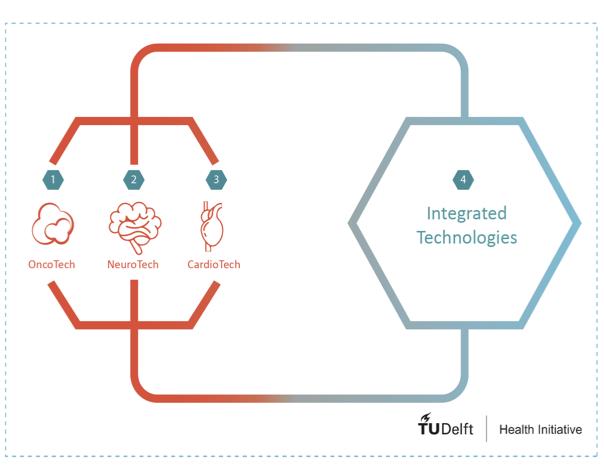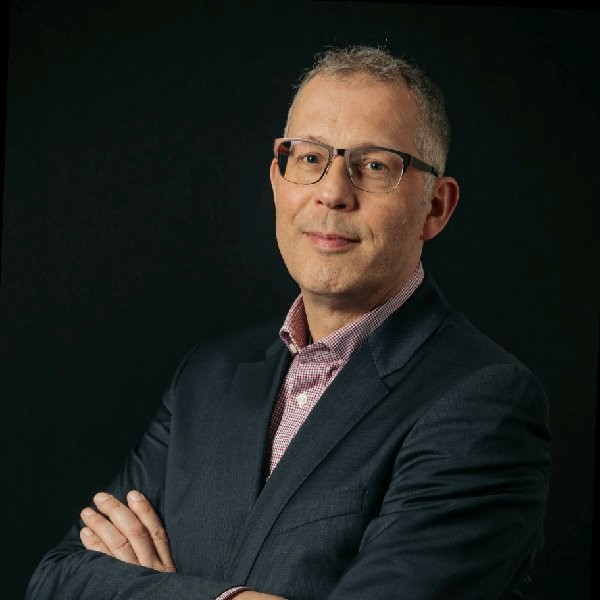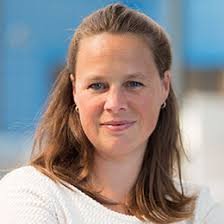Delft Health Initiative 2.0
At TU Delft, over 30% of the staff are involved in healthcare-related research, ranging from fundamental bionanoscience to living labs embedded in society. Researchers at the internationally highest ranked university in the Netherlands have access to a wide range of unique high-quality research facilities.
In 2009, the Delft Health Initiative was set up. Its mission was to “integrate science, engineering and design for sustainable healthcare based on innovative technologies”. Since then, a cross-campus network has been established that has joined formerly stand-alone healthcare-oriented research programs into a healthcare-oriented community that can take leadership in innovation for healthcare.
The potential of our health-oriented expertise has recently been underlined through the partnering with Erasmus Medical Center for a Convergence Agenda, comprising four themes of great complementarity in expertise between Erasmus MC and TU Delft.
The approach of the Delft Health Initiative (DHI) has been characterized by an internal focus on four themes, and a drive to connect TU Delft expertise to external parties. This has enabled the DHI to become a core partner in larger national and international communities, for example Medical Delta, Holland PTC and EIT Health.
Now that we have laid the base for connected health-oriented research at the TU Delft we can build upon this foundation. In a time when the healthcare system needs technological solutions more than ever before, it is both necessary and desirable to move forward with the DHI and utilize existing expertise and the established network to its full potential.
Delft Health Initiative 2.0 will therefore continue with a threefold aim: to focus expertise (strengthen three interconnected healthcare themes), to develop talent (scout and support future generations of scientists) and to connect these researchers to (inter)national initiatives and research programs.
Theme leader NeuroTech: Prof. dr. ir. W.A. (Wouter) Serdijn
Wouter Serdijn started his career with an MSc and a PhD in electrical engineering and microelectronics at the TU Delft. He is an exceptional low-voltage and ultralow-power circuit-man, but it is the medical application of integrated circuits that distinguishes and drives him. Think of wearable, implantable and even injectable biomedical devices for monitoring, diagnosing and treating a multitude of medical disorders. Tapping into the electrical pathways of the human body to restore a 100% healthy life. He is currently full professor of Bioelectronics at TU Delft and visiting honorary professor at University College London, as well as director of the Biomedical Electronics Foundation. He has won numerous (inter)national research grants, including a recent STW grant on the real-time sensing of neural signals.
Theme leader OncoTech: dr. ir. D.R. (Dennis) Schaart
Dennis Schaart has been active throughout his career at the intersection of physics, technology and medicine. He obtained his PhD in Applied Sciences at TU Delft. As a researcher and developer at Nucletron in the field of internal radiotherapy, he has experienced how the development of new technology can make a difference in what a doctor can do for a patient. Since 2003, he has been a scientist and associate professor at TU Delft. There he is in charge of the Medical Physics & Technology section, where he develops new methods and technology for medical imaging and therapy. He is particularly interested in the use of ionizing radiation for the diagnosis and treatment of cancer. He coordinates HollandPTC-related proton therapy research at TU Delft and is a member of the HollandPTC R&D Program Board. While he has a predilection for fundamental questions and unorthodox solutions, he ultimately wants to make a difference in clinical practice. In his spare time Dennis enjoys playing the drums.
Theme leader CardioTech: dr. ir. M.S. (Maaike) Kleinsmann
Maaike Kleinsmann is associate professor at the Faculty of Industrial Design at TU Delft where she graduated in 2001 on a heart monitor and obtained in 2006 her doctoral degree for her thesis on collaborative design. She currently studies how design could support the development of smart product-service-systems. She particularly likes to work in the field of healthcare, where digital transformation is urgently needed and where collaborative design is essential from the development of product-service-systems that are desirable for all stakeholders involved. She founded a fieldlab called Cardiolab together with De Hartstichting and Philips, which already resulted in a sensor bracelet for detecting atrial fibrillation. Maaike has received several NWO research grants and is also the 'kwartiermaker' of the Cardiology Tech line of the Delft Health Initiative. Moreover, she is one of the founders of an international Special Interest Group on Healthcare Systems Design Research.




